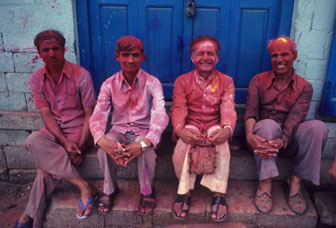How to travel ethically
How to travel ethically:
An interview with writer and responsible tourism expert Jeff Greenwald
Rhett Butler, mongabay.com
November 27, 2006
Ecotourism is hot. Travel companies everywhere are slapping eco-friendly labels on their tours and hotels to attract green-minded visitors. Alas some “ecotourism” is not really good for the environment or local people. That three-week round-the-world eco-tour via private jet for just $42,950 will generate a lot of greenhouse gases as you’re flying between plush lodges that import food and staff from other places. Likewise those wood carvings purchased in tourist centers may come not from indigenous artisans but a factory turning endangered rainforest hardwoods into throwaway tourist items. Heavy anchors dropped on reefs are good neither for the coral reef ecosystem nor the sustainability of the local tourism industry. So what’s a true “ecotourist” to do? Is it really possible to travel without trampling culture and tradition and further soiling the environment?
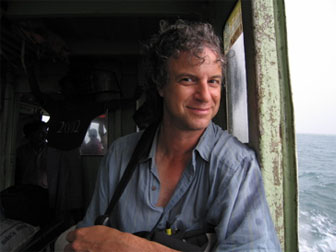
Jeff Greenwald on assignment in Sri Lanka, By Dwayne Newton |
Writer Jeff Greenwald says it is. Greenwald, who wrote the first international blog in 1993/1994, has authored several books (listed below) and has written for The New York Times Magazine, National Geographic Adventure, Outside, and Salon.com. He is Executive Director of Ethical Traveler (ethicaltraveler.org), a global community dedicated to exploring the “ambassadorial potential” of world travel.
Greenwald graciously fielded some questions from mongabay.com on his philosophies for ethical travel as well as his inspirations as a writer.
Mongabay: What is your favorite place and why?
Greenwald: My favorite place — aside from the San Francisco Bay Area — would have to be Nepal. It was the first place I really bonded with. Moving to Kathmandu in 1979 was the first time I lived in another country, studied its culture, learned its language. I’ve been returning off and on for the past 27 years.
Mongabay: How did you become a travel writer?
Greenwald: Well, I’m not strictly a travel writer. I do a lot of science and environmental writing, and also write about politics and popular culture. As a teenager I was always deeply inspired by films about exotic and far-off places — films like Lawrence of Arabia, and 2001: A Space Odyssey. They filled me with a desire to seek out remote places.
Mongabay: How does it work? Do you pitch a story first then travel or vice versa?
Greenwald: At this point of my career it works both ways. Sometimes I’ll pitch a story that interests me; at other times something will come across an editor’s desk that looks like a “Jeff story,” and he or she will give me a call.
Mongabay: Do you have any advice for aspiring travel writers?
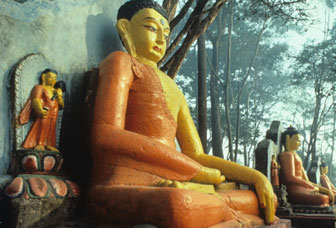
Buddha in Nepal. Photo by Jeff Greenwald
Photo taken by Jeff Greenwald during the Holi festival in Jaisalmer, Rajasthan, in India |
Greenwald: You don’t necessarily have to go to school with the intention of being a writer. That said, it would be misleading to think anyone can be a writer. It’s like saying anyone could be Jungian psychologist, or a jazz pianist. Some people have proclivities towards the work they do. If you are creative, are willing to put in the time, and can accept the rejection that often comes with the territory, you might be cut out to be a writer.
It’s best to start off by writing for the shorter, “front of the book” sections in magazines. For travel writing, it’s important to realize that virtually every destination on Earth has been covered — so you need to develop your own angle on a destination. An example I like to give in my workshops is a friend who’s a fire fighter. When he travels, he often visits local firehouses, then writes about his encounters. I have another friend, Elliot Hester who writes about his adventures as an African American flight attendant
These days few editors will consider a general story on Madrid, unless you are a known, marketable writer. But if you are a fan of stained glass, and write an article on the stained glass windows of Madrid’s cathedrals, that might be a different story.
Mongabay: How can one become a more ethical traveler?
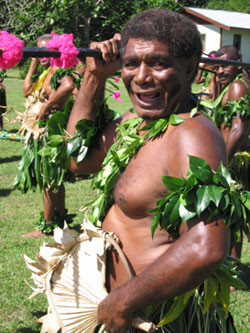
Dancers at a kava ceremony in 2006 in the village of Viani on Vanua Levu island, Fiji. Photo by Jeff Greenwald. |
Greenwald: First learn about where you are going. Do your research — the Internet is a wonderful resource for this. Understand local customs and traditions. Learn some of the local language. Most importantly, realize that the people in the place you visits are human beings like you. They’re not objects in a museum display case. Treat people as you would wish to be treated.
One of the first things you can do to become a more ethical travel is to offset the carbon emissions of your flight. Jets burn tons of fuel, and produce huge amounts of carbon dioxide. By the simple act of traveling, you are contributing to the problem. Why not be part of the solution? There are a number of non-profits that offer carbon buy-backs, and plant trees to offset your calculated carbon emissions.
Mongabay: Where are the best places for an ethical traveler to visit?
Greenwald: My advice is to check out our list of 13 Top Travel Destinations on the Ethical Traveler website. One way to actually support such countries — places that are doing things right, or at least trying to — is to visit them. Traveling to these countries puts money into the hands of local
people, and helps encourage the country to protect its environment, preserve natural habitat, and respect human rights.
Mongabay: Is it best for ethical travelers to avoid places like Burma (Myanmar), where there are serious concerns about government links to tour operations? Or is engagement better?
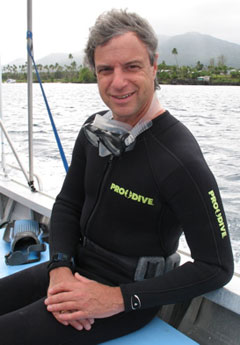
Photo of Jeff Greenwald on assignment in Koh Chang National Park, Thailand, by Sashi Braga |
Greenwald: When talking about places like Burma, Cuba, and now Iceland, you face two questions: What are the ethics of visiting a country where the government violates human rights; and how can you travel to them without benefiting the government and supporting human oppression or environmental degradation. The key to traveling in such places is intention, and awareness. One needs to be intent on learning more, and vigilantly aware of where one’s money is going.
In Burma, specifically, I think it is indeed possible to travel ethically, but only as an individual: supporting local inns, restaurants, and artisans. It’s a different story if you’re traveling in a group. In that case you will likely be paying government kickbacks, staying at multinational hotels, and using government airlines and services.
Mongabay: You bring up Iceland, which has just resumed commercial whaling of endangered Fin whales. Do you think there will be any tourism fallout from this decision?
Greenwald: Absolutely. There already has been, and there will be more; search “Iceland tourism boycott” on the Internet for more information. The blunt truth is that there’s no excuse for killing an intelligent, highly social mammal, much less an endangered species. Indigenous rights are not a valid argument in this case. All sorts of barbaric indigenous practices — from female genital mutilation to tiger hunting — have been banned in the past century. The same ethic should hold for whaling.
Mongabay: When will it be easy for travelers to determine what their true options are when it comes to ecotourism? There seems to be a general lack of awareness about a single standard for certifying whether a hotel or lodge meets “ecotourism” criteria?

The Golden-headed Langur or Cat Ba Langur (Trachypithecus poliocephalus), endemic to the island of Cat Ba in North Vietnam. Photo courtesy of the Seacology Foundation. |
Greenwald: There are no universally credible certification systems at this point for trips, though green standards do exist for hotels. The problem is, to have accountability, an organization would need to send representatives to check up on all such places, which would be prohibitively expensive. Without such a resource, it’s critical that we do our own research. Scour the Internet for positive or negative feedback about tour operators and their facilities. And don’t be afraid to ask questions: “Do you buy supplies from local markets?” “Who owns your company?” “What do you do with your trash?”
Mongabay: In some places it’s obvious that prices have been marked up with the expectation that visitors will bargain, while in other areas tourist items and handicrafts are so inexpensive it seems wrong to bargain. What’s the ethical way to bargain?
Greenwald: An ethical traveler will bargain fairly with respect for the seller. A few rupees one way or the other will not ruin you. Both parties should leave the transaction satisfied.
Mongabay: What’s the best way to find out about local taboos?
Greenwald: The world is a lot different than 10 years ago. The Internet has changed everything. It’s now easy to spend just a few minutes online to
learn most of what you need to know about local taboos for virtually anywhere in the world. Most of it¹s common sense, of course; like being respectful to images of the Buddha, or finishing the food on your plate. It takes some homework, but the info is readily available. Recently I Googled Uganda Travel Taboos – 44,700 hits. Thailand – 118,000. France? 320,000.
Mongabay: What’s the best way to give back to a community around a lodge or hotel, especially in developing countries?
Greenwald: If you strongly bond with a community, it’s a good idea to ask what they need. Maybe they could use books for their library, or parts for their sewing machines. Help could be given to a local orphanage, or to a specific family . When you return home, raise some money by telling your friends what you’d like to do, or through your blog. Once you have the money, send it to a pre-arranged person can be trusted and will be accountable for distributing the funds properly.
Alternatively, you can find out which organizations are already doing work in the community, and contribute to their efforts.
Mongabay: People often ask “What sort of gifts should I bring for children in a far off place?” Isn’t it problematic to give gifts or money directly to children? How should this be handled?
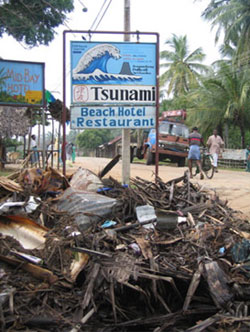
The photo was taken in January, 2005 ii Arugam Bay, eastern Sri Lanka, after the deadly tsunami |
Greenwald: I strongly believe that one should never give gifts directly to children in the developing world. If you have formed a bond with a child, or with a group of children, give the gifts to their parents, teachers, or community leaders. This is where they should turn for gifts and rewards, not to short-term visitors and tourists. Sweets are doubly bad, as they present a dental health issue as well. Handing gifts out to children while trekking is especially unwise, since it encourages begging and impacts future visitors. Many routes in Nepal and Peru, for example, have been turned into virtual trick-or-treating runs.
Instead of doling out gifts, one can bring maps to show, or pictures of one’s family or home town to share. Magnifying glasses and prism are also fascinating. There are lots of way to interact with kids without buying their good will. Take a look at my article, Coping with Begging on Third World
Trails for more details.
Mongabay: Can you recount one of your most transformative travel experiences?
Greenwald: One of the most memorable episodes in my travels occurred in August, 1999, in Iran. A small group of Americans was visiting the country to observe the total eclipse of the sun. On the afternoon of the event, I found myself in Esfahan’s enormous Emam Khomeini Square: a lone American among some 50,000 Iranians.
Shortly before totality, a small but noisy anti-U.S. demonstration erupted about 50 yards away from me, clearly for the benefit of the international press. American flags were set ablaze, and fists waved in the air. The European news teams rushed in for better camera angles. At the same time, something unexpected happened in my immediate area. All the nearby Iranians — middle-aged couples, picnicking students, even schoolchildren — rose to their feet, and formed a circle around me. A child took hold of my finger; a young man placed his hand on my shoulder. An older man, with a black turban and thick beard, leaned toward me with a disgusted expression. “You see those people?” He pointed toward the demonstrators. “They should get a job.”
It really showed me that people everywhere, even in places we think of as dangerous, are very much the same. And it demonstrated that kindness can be found in almost any place, in any situation.
About Jeff Greenwald
Jeff Greenwald resides in the San Francisco Bay Area and is the author of four books: Mister Raja’s Neighborhood, Shopping for Buddhas, The Size of the World, Future Perfect: How Star Trek Conquered Planet Earth, and Scratching the Surface. His personal web site is http://www.jeffgreenwald.com
>



